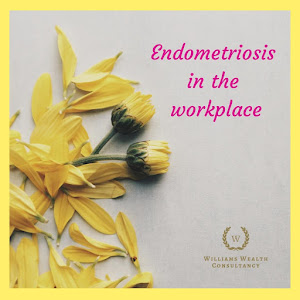Women’s Health @ Williams Wealth – Learning to work with Endometriosis
March is Endometriosis Awareness Month – so what better time than now to share my story of how to work successfully with a Chronic Illness.
Endometriosis affects 1 in 10 women, yet so many of us still suffer in silence, particularly at work. This is a disease where cells, similar to the ones found in the womb, grow amongst other parts of the body such as on the Ovaries, Liver, Bladder, Kidney, Bowel, in fact, the only place Endometriosis hasn’t been found to grow, is on the Spleen.
I was diagnosed with Endometriosis at the age of 23 via a Laparoscopic Surgery and was fairly certain the diagnosis was coming. I’d visited the GP so many times for various pain & period related struggles throughout my teenage years that when I finally got a referral to a Gynaecologist for further tests, I’d began researching the disease myself, mentally ticking a box next to every symptom listed on every webpage I could possibly find.
Following my diagnosis, the next step was learning to comfortably live with a Chronic Illness that currently has no cure, well, I’m maybe not there just yet, but I can definitely tell you ways to work with it!
When I first started my job in 2013, it was just me & my boss (an ex-military male) and one day I’d had to pluck up the courage to suggest it could possibly be a good idea to have a bin…in the toilet, so you can imagine how closed I was about my personal struggles each month. Luckily over the course of my many visits to the GP, the business had started growing as well and we’d got a lovely female Practice Manager join us as well as other female members of staff.
Since my diagnosis and educating myself around the disease, I’ve been taking every opportunity to educate my workplace too, this way it can help us find ways to keep me in work comfortably.
So here are my steps to making life as a spoonie that little more manageable in the workplace:
1) LET’S TALK IT OUT- Being open and honest helps me, but it also helps those working around me understand if I’m being a little slower than usual that particular day. I look at it as I’m being pro-active, rather than waiting to be pulled into a meeting and asked why I’m behind on my work or why I seem ‘away with the fairies’ that day, I’m telling people. ‘Look I’m really struggling today, I may not be working at full capacity.’ It sets the expectations for the day, week, or however long the flare wants to stick around. I can be QUITE the over-sharer, but so what?! I have no issues telling people what’s happening, (or what it feels like is happening on the inside of my body), because if it’s affecting me, it’s going to affect my mood and I guess it helps if others around me can understand that too.
2) THOUGHTFUL PLANNING- When I know I’m getting close to having a flare up, or I’m in a flare up, I mentally prioritise my work for the day. I think ‘what is the most important task I need to do today?’ and I’ll get that done first. Anything after that is a bonus, and if I have to go home early because the pain is so unmanageable, well at least I’ve done that one task.
3) ASK FOR FLEXIBILITY- I’ll often keep in touch with my Practice Manager before & after work too, I’ll check in and let her know when I’m struggling and in the mornings if I need to come in late because I’m waiting for the pain killers to kick in or I’m having a hot bath to relax those muscles, she completely understands, because that extra half hour of self-care in the morning could make all the difference to my productivity during the day.
4) SPOONIE STASH- At work I’ll keep nearby all of the following; herbal teas (turmeric for inflammation & ginger for sickness), a TENS Machine for those real dull achy days, paracetamol & other pain killers, wheat bag, hot water bottle, soothing patches. You can never have enough options and it’s good to keep stocked up!
5) KNOW YOUR LIMIT- As much as I love my job and I hate to feel like I’m letting the team down, I have to put myself & my health first. Sometimes that means going home early or not going to the office at all because deep down I know it would cause more stress on my body than it’s worth, which could prolong the flare up. It’s important to push yourself and keep yourself going, but to also know when to say enough.
So there we go, my list to managing employment and illness. I think the best thing we can do is to be honest and discuss how we’re feeling mentally & physically, speaking up is the only way we can get the support we need, and it helps raise a little awareness along the way too!









Post a Comment